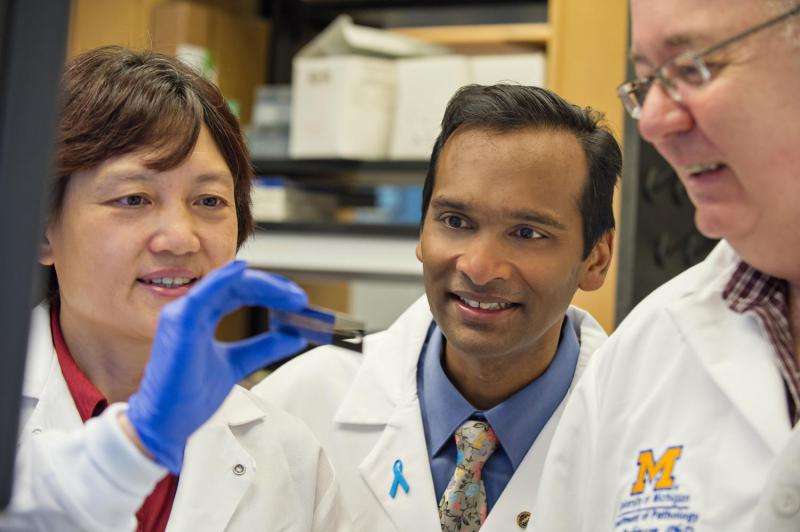Genetic landscape can impact treatment for children with rare, aggressive cancer

For children with rare, aggressive and advanced cancer, precision medicine may help doctors determine their best treatment options, a new study finds.
Using information from a patient's entire genome helped suggest personalized treatment options for nearly half of children with cancer, and led to specific treatment changes in a quarter of these patients, according to researchers at the University of Michigan Comprehensive Cancer Center and C.S. Mott Children's Hospital.
The study is based on a program implemented at Mott in 2012 called Peds-MiOncoSeq, which includes sequencing the tumor's DNA and RNA as well as normal DNA from children and young adults with cancer that has relapsed or that is rare. Results from the first 102 patients enrolled are published in the Journal of the American Medical Association.
"We found that for some children with rare, difficult-to-treat and aggressive cancers, this technology can dramatically change the course of their treatment," says lead author Rajen Mody, M.D., M.S., pediatric oncologist at U-M's C.S. Mott Children's Hospital.
"We have made significant strides in cancer treatment but for some kids, especially those with metastatic or relapsed disease, even the most advanced, proven therapies have not been able to improve their outcome. Our approach in precision oncology showed its greatest promise in these difficult to treat patients - 80 percent of our study patients had relapsed or refractory disease, and those are the ones who benefited most from our study."
Overall, 46 percent of patients had an actionable finding: a specific genetic anomaly that is the target of an approved or experimental drug; a change in diagnosis; or genetic counseling for inherited cancer risk that could affect the patient or the whole family. Further, 25 percent of patients went on to receive a study recommended novel therapy, which resulted in 10 percent of patients achieving a partial or complete remission lasting six month or longer.
"We were excited to see an actionable finding in such a substantial percentage of patients, and we think it could potentially be higher over time. These are patients who had exhausted all proven therapeutic options or who had an extremely rare diagnosis. If we can find a clinically actionable event and have a chance to act upon it, we show in this study that it can have a big impact on that patient," says senior study author Arul Chinnaiyan, M.D., Ph.D., director of the Michigan Center for Translational Pathology.
In addition, researchers also found 10 percent of patients had an inherited cancer risk potentially impacting multiple family members. Those patients and their families were offered genetic counseling. Four of the nine families had no notable family history to suggest an inherited risk, and they would not otherwise have been referred for genetic counseling.
Genetic sequencing involves looking at all of the DNA and RNA that are part of a patient's genes. The scientists comb through this enormous amount of data to identify anomalies that may prove to be targets for existing approved or experimental therapies.
"Each child is different when it comes to predicting how they will respond to different cancer treatments," Mody says. "This individualized genetic information helps us better predict what genetic change is driving a particular child's tumor, what's causing the resistance to the treatment and how to predict response to certain treatments. This knowledge can help us match each patient with the specific therapy most likely to benefit him or her."
As part of the program, all sequencing results were discussed at a precision medicine tumor board, which included pediatric and adult oncologists, genetics specialists, pathologists, bioinformatics specialists and genetic counselors, among others. This group discussed all results and assessed the feasibility of pursuing treatment options based on the genomic findings.
The cost for sequencing was approximately $6,000 per patient and was covered under the research protocol. Patients in the study did not pay for sequencing. The researchers expect to see sequencing costs decrease over time as the technology improves and competition increases. In addition, it took researchers about seven to eight weeks to report the sequencing results back to treating physicians and families.
"These are early days and the full promise of precision medicine is yet to be fully realized," cautions Mody. "We need better targeted therapies designed for children, and turnaround time for sequencing needs to be less than two weeks for it to be a regular part of a patient's treatment plan."
In time, the researchers hope to offer gene sequencing to most, if not all, pediatric cancer patients at Mott. These initial findings have paved the way to expand the program into a more comprehensive pediatric precision oncology program that researchers expect to launch in 2016, which will include offering sequencing to pediatric cancer patients diagnosed at other hospitals.
"The earlier we can carry out the sequencing the better chance of identifying the right therapy before they develop resistance to therapies we could predict wouldn't work. We hope to make it commonplace for patients to have a molecular blueprint of their tumor to guide treatment choices," Chinnaiyan says.
The study is the first to report on combined multiple genome sequencing approaches (tumor as well as normal DNA and tumor RNA) in real-time, in children and young adults with relapsed cancers. A similar study is currently underway in adult patients at the University of Michigan Comprehensive Cancer Center. For more information on Mi-OncoSeq or Peds-MiOncoSeq, call the U-M Cancer AnswerLine at 800-865-1125.
More information: Journal of the American Medical Association, Vol. 314, No. 9, Sept. 1, 2015, DOI: 10.1001/jama.2015.10080



















